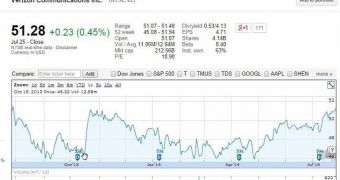You must have already heard by now about the FISC and FISA thanks to the leaked documents from Edward Snowden that put the court on everyone’s radar. Most import, however, is the fact that the members of this secretive court that’s supposed to keep a close eye on what the NSA is doing isn’t really doing its job.
While the judges seemed really offended over the fact that the court was called the “NSA’s rubberstamp,” the fact that they didn’t deny the agency any of its requests in many years suggests that that’s exactly what the court does – give the NSA free reign over what it can and what it cannot do.
Over the weekend, a report from Vice has indicated that there’s a little more to the connection between the court and the NSA. Two of the FISC judges are stakeholders at Verizon, one of the companies that the court served on a silver plate to the NSA, telling the agency that they could get whatever information they wanted.
Citing a document from 2013, Vice reports that Susan Wright and Dennis Saylor, both judges at FISC, own Verizon stock.
Wright made her purchase of Verizon stock valued at $15,000 (€11,164) or less on October 22, while Dennis Saylor already owned shares with the telecommunications giant and collected a dividend of less than $1,000 (€744). The exact amounts owned by each of them and the values of their investments are unclear because they aren’t revealed in exact numbers in official papers, but rather in ranges.
Why does this matter? Because it may soon be the turn of Judges Saylor or Wright to renew the next request for metadata issued by the NSA.
According to inside rules, the FISA Court rotates continuously, changing the way it deals with requests from the government. Basically, as Vice points out, each judge takes turns overseeing surveillance demands. While the schedule they’re going by is unclear, it only makes sense for each of them to take a turn in approving one round of metadata collecting every 90 days.
This means that the two judges who own Verizon stock could be the next ones to handle surveillance demands, which might translate into a conflict of interest. Federal judges are bound by an ethics law to recuse themselves from cases in which they hold a financial stake in the outcome or where their impartiality might be questioned.
Therefore, since the two own Verizon stock, it wouldn’t really bode well for them to have a say in whether the NSA does or does not get to collect metadata from the telco.

 14 DAY TRIAL //
14 DAY TRIAL //